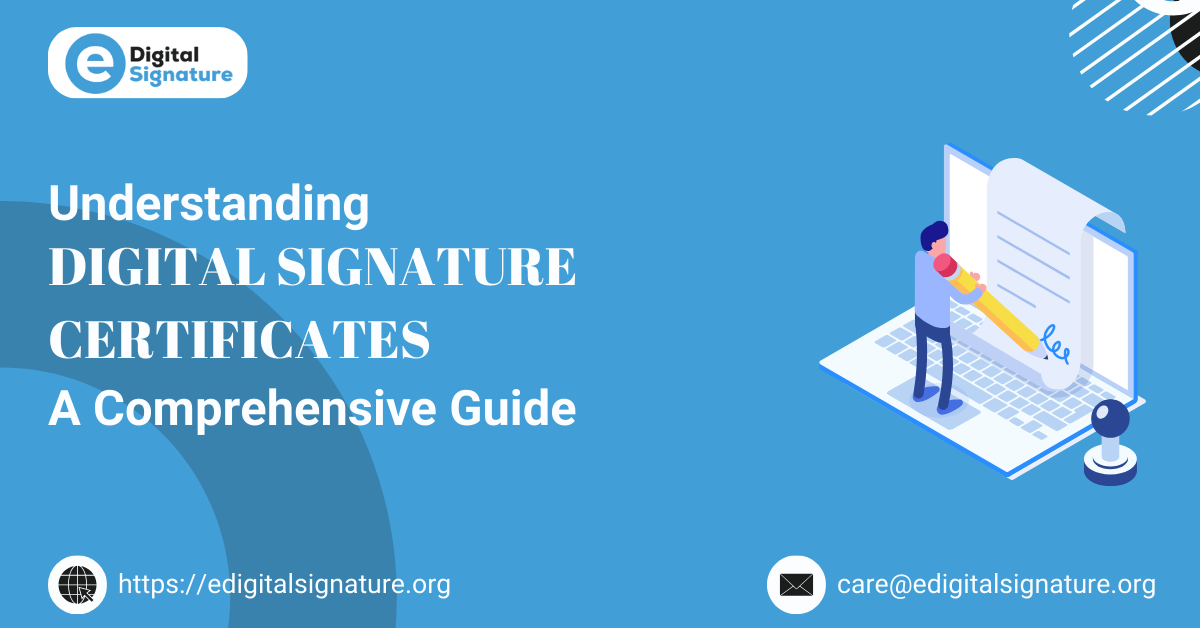In an increasingly digital world, ensuring the security and authenticity of online transactions is paramount. One of the key tools in achieving this is the Digital Signature Certificate (DSC). This technology has become essential for a wide range of applications, from business transactions to legal documents. In this article, we will delve into what a Digital Signature Certificate is, how it works, its types, applications, and the benefits it offers.
What is a Digital Signature Certificate?
A Digital Signature Certificate (DSC) is an electronic form of a signature that authenticates the identity of the sender of a document. It is the digital equivalent of a handwritten signature or a stamped seal, but it offers far more inherent security. DSCs are used to sign electronic documents, assuring the recipient about the authenticity and integrity of the document.
A DSC contains information about the user’s identity (name, email, country, APNIC account name, and the public key). It is issued by a Certifying Authority (CA) and is legally recognized in many countries.
How Does a Digital Signature Certificate Work?
The process of using a DSC involves two key elements: a private key and a public key. Here’s a step-by-step explanation of how it works:
Creation of Keys:
When a DSC is issued, a pair of keys (private and public) is generated. The private key is kept confidential by the owner, while the public key is distributed widely.
Document Signing:
When a user wants to sign a document digitally, they use their private key to create a unique digital signature. This signature is a hash value of the document’s content, encrypted with the private key.
Verification:
The recipient of the document uses the sender’s public key to decrypt the signature. If the decrypted hash matches the hash of the received document, it verifies the authenticity and integrity of the document.
Types of Digital Signature Certificates
Digital Signature Certificates come in different types, each serving specific purposes:
- Class 1 Certificates: These are basic certificates used for securing email communication. They provide a basic level of security and are primarily used by individuals.
- Class 2 Certificates: These are used for transactions where the risk of data compromise is moderate. They are often used for filing income tax returns, registration of companies, and other medium-security transactions.
- Class 3 Certificates: These are the highest level of DSCs, providing the most stringent security measures. They are used for e-commerce, e-tendering, and other high-value transactions where a high level of security is essential.
Applications of Digital Signature Certificates
The applications of DSCs are vast and varied, encompassing different sectors and activities:
E-Filing: DSCs are widely used for e-filing of income tax returns, company registrations, and other government-related filings.
E-Tendering: In the procurement process, especially in government tenders, DSCs ensure the authenticity and integrity of the bids submitted online.
E-Commerce: DSCs help in securing online transactions, ensuring that the transactions are genuine and not tampered with.
Legal Documents: DSCs are used in signing legal documents, contracts, and agreements, ensuring that the documents are legally binding and tamper-proof.
Email Security: By signing emails digitally, DSCs help in verifying the sender’s identity and ensuring that the email content has not been altered.
Intellectual Property: In the realm of intellectual property, DSCs are used to sign and secure patents, copyrights, and other IP-related documents.
Benefits of Digital Signature Certificates
The adoption of DSCs offers numerous benefits, making them indispensable in the digital age:
Security: DSCs provide a high level of security for online transactions, ensuring that the documents are not altered and are from a legitimate source.
Authentication: DSCs verify the identity of the sender, ensuring that the documents are from a trusted source.
Integrity: The use of DSCs ensures that the content of the document has not been tampered with or altered in any way.
Legal Validity: In many countries, DSCs are legally recognized, providing legal standing to electronic documents and signatures.
Cost-Effective: The use of DSCs reduces the need for physical documents and postage, making it a cost-effective solution for businesses.
Time-Saving: With DSCs, documents can be signed and sent instantly, saving time and improving efficiency.
Non-Repudiation: DSCs provide evidence of the origin and the status of an electronic document, preventing the sender from denying the authenticity of their signature.
Also Read, Buy Digital Signature Certificate Online
Conclusion
Digital Signature Certificates are a cornerstone of secure digital communication and transactions. They offer unparalleled security, authenticity, and integrity to electronic documents, making them essential in today’s digital landscape. From e-filing and e-commerce to legal documents and email security, the applications of DSCs are vast and crucial. As businesses and individuals continue to move towards digital platforms, the adoption of DSCs will only grow, further cementing their role in securing digital interactions. The benefits they offer in terms of security, cost savings, and efficiency make them an invaluable tool for anyone engaged in digital transactions.


